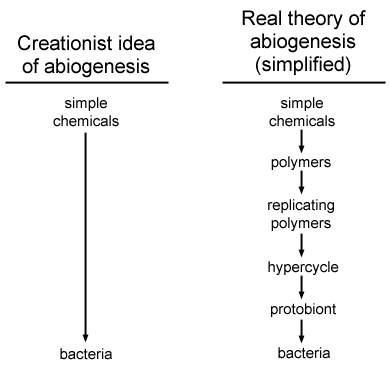I would begin with the fact that "LIFE" is a property of organization, and not one of substance.
In order for evolution to be scientifically plausible one must prove that life, even on the simplest level, can suddenly take place.
Weaknesses in
evolution. You're describing abiogenesis, which did
not happen suddenly, almost certainly. First, self-sustaining chemical reactions started to take place, which gradually become isolated in micelles, which gradually accumulated the tools of replication, and life began. There's no sudden transition at all, it all happens smoothly.
That either happens by random chance, (Which would be reproduceable)
And you can be quite sure we're trying to reproduce it. It is difficult to do, though, when you don't know what the conditions were under which life first occurred, and when life arose over hundreds of millions of years.
If everything changes into something else, natural selection weeds out the weak, environmental changes shape and form the future generations, etc. Then surely we can reproduce the most basic conditions necessary to "kick" this common and frequent process into gear.
Common and frequent process? Whoever said that abiogenesis was either of those? It need only have happened
once. Furthermore, for us to replicate it, we not only need the time, but the precise starting conditions, which we don't know. We have a good idea, but it's hard to reproduce them exactly.
I'm not talking about making a human being, or a mouse, or a fish, or even a microscopic organism.
I'm talking about a simple cell.
Bzzt. Life didn't start with a cell - a cell is not "simple" by any means - a single cell is, in itself, a triumph of evolution. You obviously haven't seen this:
Note that "real theory of abiogenesis" is
simplified that means there are
more steps than listed.
We could even cheat,... skip the entire DNA-protein relationship, that's like the chicken and the egg, you can't have complex protein without the DNA code to tell it what it is, and you cannot have the DNA blueprint, without it somehow knowing what codes it is supposed to contain.
You're not using your imagination. If you think to yourself, "well, supposing evolution were true, DNA must have come about without protein, or vice-versa - how could that have happened?" then you might actually think of something.
As it happens, scientists are way ahead of you. Very primitive life almost certainly utilized RNA, not DNA, as its genetic code. We can tell this because some strands of RNA actually spontaneously self-replicate. There's no need for any protein - if you give them nucleotides (which form naturally in what is thought to be early-earth conditions) they will just make more of themselves. If you put this inside a tiny bubble of fat, you have a very primitive form of "life." But the RNA would not replicate perfectly, so mutations would gather. After perhaps millions of years, mutations would gather which would produce a strand of RNA capable of catalyzing the formation of more fatty acids. The self-replicating fat bubble now produces more fat throughout its lifespan. When the bubble gets too big, it splits in two, dividing the genetic material along with it.
Lo and behold, you've got primitive mitosis.
This is what abiogenesis researchers are trying to achieve, only with pNA instead of RNA.
Surely, if this theory has any basis at all, and we have even the most basic understanding of it, and considering the millions and millions of plant and animal speces we observe today, we could reproduce a simple evidence.
The conditions necessary to create just ONE....Simple...cell.
I'd call that a pretty strong weakness.
But as I have now pointed out to you, your argument falls down for two reasons. Firstly, the theory of evolution doesn't even rely on abiogenesis. If your God wanted to zap in some bacteria, evolution starts just like that. I doubt that actually happened, but if you want to believe that go ahead - I'll freely admit that the evidence is a bit skimpier for abiogenesis than for evolution.
The second reason is that for all your attempted dramatic slow speaking, "ONE...Simple...cell" is
not simple at all. You probably couldn't even fathom the vast complexities that go into producing just one of the units that make you as a person. By raising this point, by stressing it so many times, you make it perfectly clear that you don't know much about biology. Don't you think it would be a good idea to learn something about the subject over which you're arguing?


